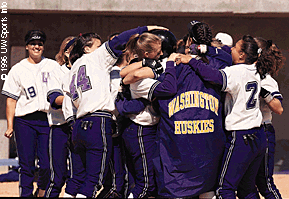


It paid off big-time. In May, the Huskies, in only their fourth year, made it to the NCAA championship game, losing to No. 2 Arizona. In four years, the UW softball team has a 184-80 record (.696 winning percentage), including 59-9 last year.
Wilson didn't always enjoy that kind of success. When she coached at Oregon from 1986-1989, she had to devote much of her time and energy to raising money. "We only had six scholarships, and it was not a well-funded program," she recalls. "It was very frustrating. Everyone agreed the women were grossly behind the men. That was ridiculous." So she left for the University of Minnesota, where she spent two years and had considerably more support. But the lure of coming to the Pac-10--which has captured eight of the past 10 national titles--to build a brand new program was too enticing to pass up.
At the UW, she has 11 scholarships. But there was one problem: Her team had no field of its own. The lack of facilities is a common stumbling block when it comes to adding women's sports these days--at the UW and elsewhere.
For two years, 20 UW softball players had to jam into two vans for the drive across the 520 floating bridge to Bellevue for its 3:30 practice. Battling rush-hour traffic to make it back by the 7 p.m. study hall was always a challenge.
"It was a nightmare sometimes," Wilson says. The new softball complex she was promised was delayed a couple of times, adding to her frustration. "Recruiting isn't easy when you can't show players where they will play," Wilson says.
At the end of the 1996 season, the team got to play a few games in its new $3 million complex. Though it is not finished, the softball stadium (which will seat 1,000) will be part of a $7 million softball-baseball complex along the shores of Lake Washington northeast of Husky Stadium.
"Facilities are the most important part of the equation," says Lesle Gallimore, the UW women's soccer coach for the past two years. She, too, has no field of her own. Gallimore is here because her predecessor, Dang Pibulvech, left for Texas. He said he was fed up with the lack of soccer facilities. Still, the lack of a home field hasn't hindered the UW team too much--in its six years, the women soccer team has a record of 64-43-8.
The women's soccer team isn't alone here. The men have no field, either. But help is on the way. Construction on phase one of a new soccer facility for both teams commences this October. Galimore's team--which advanced to the second round of the NCAA playoffs in 1996--likely will play its seven home games off campus in the upcoming season.
But the lack of a field is minor compared to what Galimore encountered while coaching at San Diego State. There, scholarship money was taken from the men's team and given to the women's, and coaching cutbacks left one coach in charge of both teams. It created a difficult atmosphere for everybody.
"Here, things are equal," Gallimore says. "There is no disparity in what we get. And everyone works together well," she says, referring to the fact that her team has been able to use some of the football team's practice fields. "I am optimistic about the future, too. This school and the area are rich in soccer tradition, and my goal is that women's soccer become self-sustaining. We are like the little brothers and sisters of football, but we want to pull our own weight."
In the larger picture, the UW is certainly doing that. Not only is Hedges one of handful of woman athletic directors leading NCAA Division I programs, but she is the first woman president of the National Association of Collegiate Directors of Athletics.
"This was a place I had to be a part of," says June Daugherty, the new UW women's basketball coach. "Women athletes of today have it so good because of all the hard work that was done in years past. But here at the UW, we are a leader because we do things right. And the fight to give women more opportunities will continue."*
Jon Marmor, '94, is associate editor of Columns.
New Womens' Basketball Coach June Daugherty
Return to the Beginning of "Fair Play"
Husky Sports Home Page
Send a letter to the editor at columns@u.washington.edu.